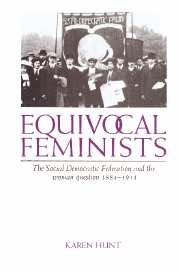Book contents
- Frontmatter
- Contents
- Acknowledgements
- Introduction
- Part 1 The woman question: the theory
- Part 2 The SDF and the woman question: the theory and practice of the party on aspects of the woman question
- Part 3 Women and the SDF: the practical implications of the SDF's understanding of the woman question
- Conclusion
- Appendices
- Bibliography
- Index
Conclusion
Published online by Cambridge University Press: 14 January 2010
- Frontmatter
- Contents
- Acknowledgements
- Introduction
- Part 1 The woman question: the theory
- Part 2 The SDF and the woman question: the theory and practice of the party on aspects of the woman question
- Part 3 Women and the SDF: the practical implications of the SDF's understanding of the woman question
- Conclusion
- Appendices
- Bibliography
- Index
Summary
So who were the ‘equivocal feminists’? Not the women of the SDF. Although all were principally socialists, many also held views and organised around issues which we can recognise as feminist. It does not matter that they never identified themselves as such. The polarisation of socialism and feminism, inherent in the socialist construction of the woman question, meant that no Second International socialist could ever adopt such a label. But, I repeat, my argument is that it was not the women who were equivocal feminists: it was the SDF itself, as an organisation, which equivocated. The socialist construction of the woman question is an equivocation over feminism.
I have argued that SDFers' practice on issues which related to women, and the party's practice toward women and their self-organisation, were circumscribed by their understanding of the woman question. The party's theory bore a direct relationship to its practice, and to explore either in isolation would be to produce a partial and therefore misleading picture. The fact that this theory was deeply ambiguous set the framework for the SDF's particular and often ambivalent practice in relation to women. This ambiguity derived from the work of the founding fathers, Engels and Bebel, and in particular from their use of the muddy concept of the sex/class analogy. Its effect was reinforced by the SDF's conception of socialism as essentially economic. Together, these two elements ensured that the woman question joined other ‘conscience’ issues, on the margins of socialism.
- Type
- Chapter
- Information
- Equivocal FeministsThe Social Democratic Federation and the Woman Question 1884–1911, pp. 251 - 258Publisher: Cambridge University PressPrint publication year: 1996

